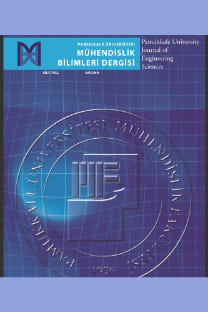Yığın üretim yapan fırınlara işlerin yüklenmesi ve çizelgelenmesi: Tamsayılı programlama modeli
Yığın üretim yapan makineler, Çizelgeleme, Tamsayılı programlama
Job allocation and scheduling of batch processing ovens: An integer programming model
Batch processing machines, Scheduling, Integer programming,
___
- Kuru B. Fırın Çizelgeleme Problemi için Tamsayılı Programlama Yaklaşımı. Lisans Tezi, Celal Bayar Üniversitesi, Endüstri Mühendisliği Bölümü, Manisa, Türkiye, 2015.
- Edis EB, Kuru B. “Özel karakteristiklere sahip fırınlara iş yükleme ve çizelgeleme problemine tamsayılı programlama yaklaşımı”. 35. Yöneylem Araştırması ve Endüstri Mühendisliği Ulusal Kongresi, Ankara, Türkiye, 9-111 Eylül 2015.
- Mathirajan M, Sivakumar AI. "A literature review, classification and simple meta-analysis on scheduling of batch processors in semiconductor". The International Journal of Advanced Manufacturing Technology, 29(9-10) 990-1001, 2006.
- Mönch L, Fowler JW, Dauzère-Pérès S, Mason SJ, Rose O. “A survey of problems, solution techniques and future challenges in scheduling semiconductor manufacturing operations”. Journal of Scheduling, 14(6), 583-599, 2011.
- Azizoglu M, Scott W. "Scheduling a batch processing machine with incompatible job families". Computers & Industrial Engineering, 39(3), 325-335, 2001.
- Koh SG, Koo PH, Ha JW, Lee WS. “Scheduling parallel batch processing machines with arbitrary job sizes and incompatible job families”. International Journal of Production Research, 42(19), 4091-4107, 2004.
- Melouk S, Damodaran P, Chang PY. “Minimizing makespan for single machine batch processing with non-identical job sizes using simulated annealing”. International Journal of Production Economics, 87(2), 141-147, 2004.
- Chang PY, Damodaran P, Melouk S. “Minimizing makespan on parallel batch processing machines”. International Journal of Production Research, 42(19), 4211-4220, 2004.
- Mönch L, Balasubramanian H, Fowler JW, Pfund ME. “Heuristic scheduling of jobs on parallel batch machines with incompatible job families and unequal ready times”. Computers & Operations Research, 32(11), 2731-2750, 2005.
- Chou FD. “A joint GA+ DP approach for single burn-in oven scheduling problems with makespan criterion”. The International Journal of Advanced Manufacturing Technology, 35(5-6), 587-595, 2007.
- Xu S, Bean JC. “A genetic algorithm for scheduling parallel non-identical batch processing machines”. IEEE Symposium Computational Intelligence in Scheduling, Hawaii, USA, 1-5 April 2007.
- Kashan AH, Karimi B, Jenabi M. "A hybrid genetic heuristic for scheduling parallel batch processing machines with arbitrary job sizes". Computers and Operations Research 35(4), 1084-1098, 2008.
- Mazumdar CS, Mathirajan M, Gopinath R, Sivakumar AI. “Tabu Search methods for scheduling a burn-in oven with non-identical job sizes and secondary resource constraints”. International Journal of Operational Research, 3(1-2), 119-139, 2008.
- Chung SH, Tai YT, Pearn WL. “Minimising makespan on parallel batch processing machines with non-identical ready time and arbitrary job sizes”. International Journal of Production Research, 47(18), 5109-5128, 2009.
- Wang HM, Chou FD. “Solving the parallel batch-processing machines with different release times, job sizes, and capacity limits by metaheuristics”. Expert Systems with Applications, 37(2), 1510-1521, 2010.
- Zhu Z, Heady RB. “Minimizing the sum of earliness/tardiness in multi-machine scheduling: a mixed integer programming approach”. Computers and Industrial Engineering, 38(2), 297-305, 2000.
- IBM Corp. IBM ILOG CPLEX Optimization Studio 12.6.2, 2013.
- ISSN: 1300-7009
- Yayın Aralığı: 7
- Başlangıç: 1995
- Yayıncı: PAMUKKALE ÜNİVERSİTESİ
Yerel olmayan elastisite teorisine göre akışkan taşıyan nanokirişin serbest titreşimlerinin analizi
Süleyman Murat Bağdatlı, Necla Toğun
Tabakalı ve fonksiyonel olarak kademelendirilmiş küresel basınç kapları üzerine analiz
Ensar Yıldırım, Halit Cebi, Murat Şen, Erkan Serdar Yılmaz
Kısa dönemli tahminlerde kullanılan uyarlamalı üstel düzleştirme için bulanık ayarlama yaklaşımı
Ders programı çizelgeleme problemi için bir literatür taraması
Geri dönüştürülmüş kestamidlerin mekanik özellikleri
Rüzgâr çiftliklerinde veri zarflama analizi ve Malmquist endeksi yaklaşımları ile performans analizi
Yunus EROĞLU, Serap Ulusam SEÇKİNER
İbrahim ÇELİKYÜREK, Aytaç BİÇER
Eş kalıp ekstrüzyon yöntemi ile alüminyum-magnezyum makrokompozit imalatı ve karakterizasyonu
